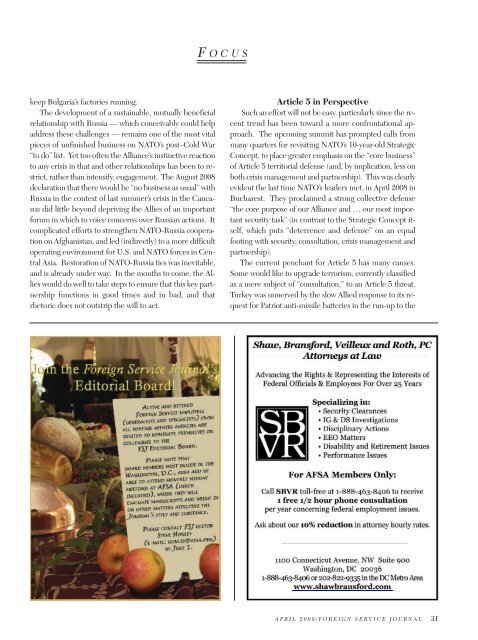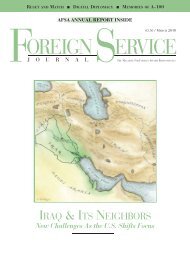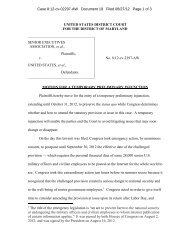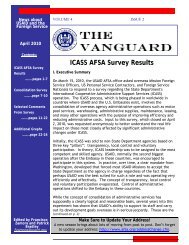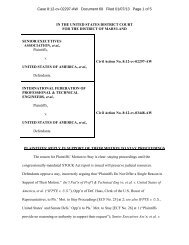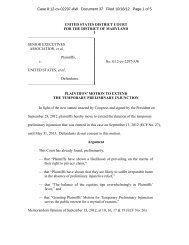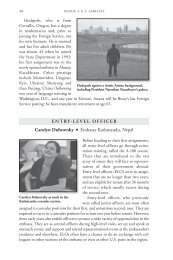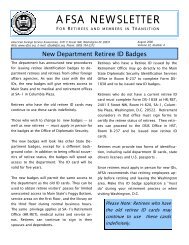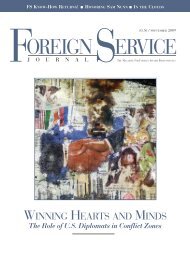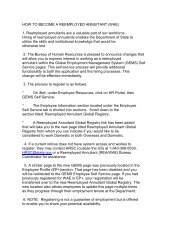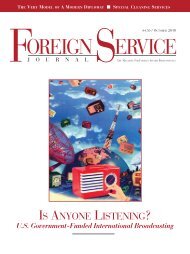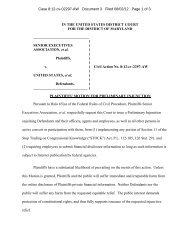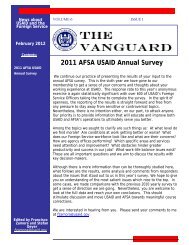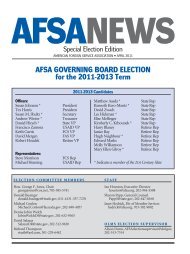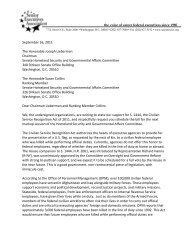F OCUS - American Foreign Service Association
F OCUS - American Foreign Service Association
F OCUS - American Foreign Service Association
Create successful ePaper yourself
Turn your PDF publications into a flip-book with our unique Google optimized e-Paper software.
F O C U S<br />
keep Bulgaria’s factories running.<br />
The development of a sustainable, mutually beneficial<br />
relationship with Russia — which conceivably could help<br />
address these challenges — remains one of the most vital<br />
pieces of unfinished business on NATO’s post–Cold War<br />
“to do” list. Yet too often the Alliance’s instinctive reaction<br />
to any crisis in that and other relationships has been to restrict,<br />
rather than intensify, engagement. The August 2008<br />
declaration that there would be “no business as usual” with<br />
Russia in the context of last summer’s crisis in the Caucasus<br />
did little beyond depriving the Allies of an important<br />
forum in which to voice concerns over Russian actions. It<br />
complicated efforts to strengthen NATO-Russia cooperation<br />
on Afghanistan, and led (indirectly) to a more difficult<br />
operating environment for U.S. and NATO forces in Central<br />
Asia. Restoration of NATO-Russia ties was inevitable,<br />
and is already under way. In the months to come, the Allies<br />
would do well to take steps to ensure that this key partnership<br />
functions in good times and in bad, and that<br />
rhetoric does not outstrip the will to act.<br />
Article 5 in Perspective<br />
Such an effort will not be easy, particularly since the recent<br />
trend has been toward a more confrontational approach.<br />
The upcoming summit has prompted calls from<br />
many quarters for revisiting NATO’s 10-year-old Strategic<br />
Concept, to place greater emphasis on the “core business”<br />
of Article 5 territorial defense (and, by implication, less on<br />
both crisis management and partnership). This was clearly<br />
evident the last time NATO’s leaders met, in April 2008 in<br />
Bucharest. They proclaimed a strong collective defense<br />
“the core purpose of our Alliance and … our most important<br />
security task” (in contrast to the Strategic Concept itself,<br />
which puts “deterrence and defense” on an equal<br />
footing with security, consultation, crisis management and<br />
partnership).<br />
The current penchant for Article 5 has many causes.<br />
Some would like to upgrade terrorism, currently classified<br />
as a mere subject of “consultation,” to an Article 5 threat.<br />
Turkey was unnerved by the slow Allied response to its request<br />
for Patriot anti-missile batteries in the run-up to the<br />
A P R I L 2 0 0 9 / F O R E I G N S E R V I C E J O U R N A L 31


